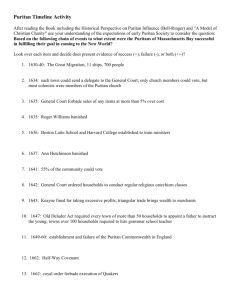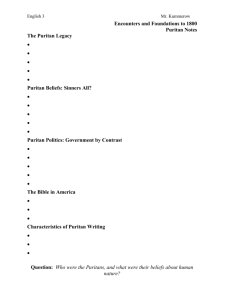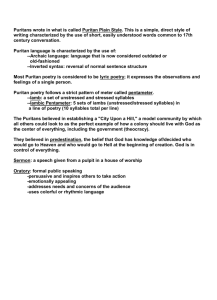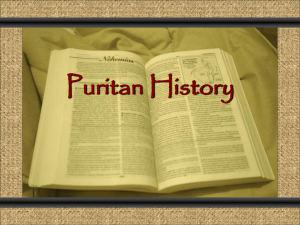City on a Hill: Puritan & American Values
advertisement
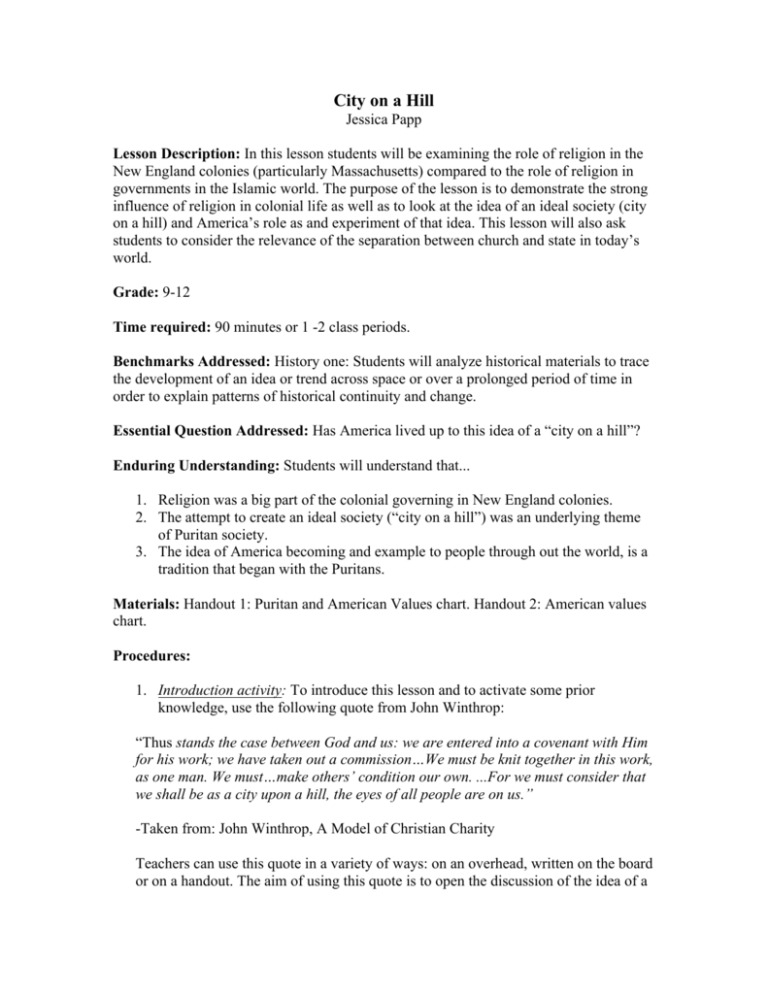
City on a Hill Jessica Papp Lesson Description: In this lesson students will be examining the role of religion in the New England colonies (particularly Massachusetts) compared to the role of religion in governments in the Islamic world. The purpose of the lesson is to demonstrate the strong influence of religion in colonial life as well as to look at the idea of an ideal society (city on a hill) and America’s role as and experiment of that idea. This lesson will also ask students to consider the relevance of the separation between church and state in today’s world. Grade: 9-12 Time required: 90 minutes or 1 -2 class periods. Benchmarks Addressed: History one: Students will analyze historical materials to trace the development of an idea or trend across space or over a prolonged period of time in order to explain patterns of historical continuity and change. Essential Question Addressed: Has America lived up to this idea of a “city on a hill”? Enduring Understanding: Students will understand that... 1. Religion was a big part of the colonial governing in New England colonies. 2. The attempt to create an ideal society (“city on a hill”) was an underlying theme of Puritan society. 3. The idea of America becoming and example to people through out the world, is a tradition that began with the Puritans. Materials: Handout 1: Puritan and American Values chart. Handout 2: American values chart. Procedures: 1. Introduction activity: To introduce this lesson and to activate some prior knowledge, use the following quote from John Winthrop: “Thus stands the case between God and us: we are entered into a covenant with Him for his work; we have taken out a commission…We must be knit together in this work, as one man. We must…make others’ condition our own. ...For we must consider that we shall be as a city upon a hill, the eyes of all people are on us.” -Taken from: John Winthrop, A Model of Christian Charity Teachers can use this quote in a variety of ways: on an overhead, written on the board or on a handout. The aim of using this quote is to open the discussion of the idea of a “city on a hill”. Teachers should help students decipher the quote and establish just what John Winthrop is talking about. This would be a good way to introduce information about the Puritan’s goal for their colony and strong religious focus. 2. Developmental Section: After an introduction students should receive notes or text reading to give the background and history of the Puritans and the Massachusetts colony. In designing this lesson I used the information in the Prentice Hall America: Pathways to the Present, Modern American History book (chapter 1 section 2 pp. 20-21) as the student background reading. Check out these sites for other materials and information: http://en.wikipedia.org/wiki/Colonial_America (section on the Puritans) http://www.teacheroz.com/colonies.htm#Mayflower http://www.hope.edu/academic/religion/reader/cityonhill.html http://stockholm.usembassy.gov/usis/history/chapter2.html http://www.digitalhistory.uh.edu/database/textbook_search.cfm?HHID=67 4 3. Group activity: Put students into discussion groups of 4-5 students. Distribute the comparison of Puritan and American values chart (Handout 1). Several Puritan values are provided for the students. Before beginning the activity make sure to go over the Puritan values so that students have a clear picture of Puritan society and the example they were trying to set. After students have an idea of the Puritan values, in their groups, ask students to come up with 4 values that are portrayed in American society today. Encourage students to think about how our government treats our own citizens as well as the way our government interacts with the rest of the world and other nations. 4. Class discussion: As a class, have students share the ideas that they came up with in their groups. On the board or overhead the teacher should be keeping a running tally of the values from today. After all the ideas have been shared, as a class narrow the list down to 3 main values. 5. Distribute Handout 2. On this sheet, have the students copy down the 3 main values that they came up with as a class. Either individually or in their groups, have the students give one example of how we as a nation/society enforce or portray those values. Debrief: After students have completed the activity, teachers should try to tie things together by asking some discussion questions such as: How have American values changed since the Puritan colony? What role did religion play in the Puritan experiment? What role does religion play today in our government? Do you see America as an experiment in being a city on a hill? In order to encourage transfer, teachers should try to lead a discussion to the war in Iraq. This event can be incorporated into this theme by looking at the idea of the United States “making the world safe for Democracy” and putting ourselves as a nation out there as an example of how Iraq should create their government in the wake of the fall of Saddam Hussein’s regime. Can the students think of any other times in history where the United States has done similar things? What might be the role of the Islamic religious law (Sharia) in Iraq’s new government? Assessment: On a separate sheet of paper have students use the work they have done so far to answer the following essay question. “Do you think that our American nation has lived up to the Puritan idea of a city on a hill? Why or why not?” Handout 1 Name ___________________________________________________ City on a Hill List the values that our government portrays today. Think about our laws, the way we interact with other nations and the way the government treats its citizens as well as citizens of other nations. Puritan Values • Set an example for all to follow: “City on a Hill.” • Primary purpose of government was to punish the breaking of God’s laws: religion had great influence on governing. • Separation of church and state: rejected idea of church courts, and forbade ministers from holding public office. • Right to vote: annual elections, extended the right to vote and hold office to all “freemen”. (This term originally only meant church members, but many more men were able to vote in Massachusetts than back in England.) American Values Handout 2 American Values: On this sheet, copy down the three main American values you and your class has decided on. Give one specific way we as a nation and society enforce or portray each value. 1. Value: _______________________________________________ Example: _______________________________________________ 2. Value: _______________________________________________ Example: _______________________________________________ 3. Value: _______________________________________________ Example: _______________________________________________




